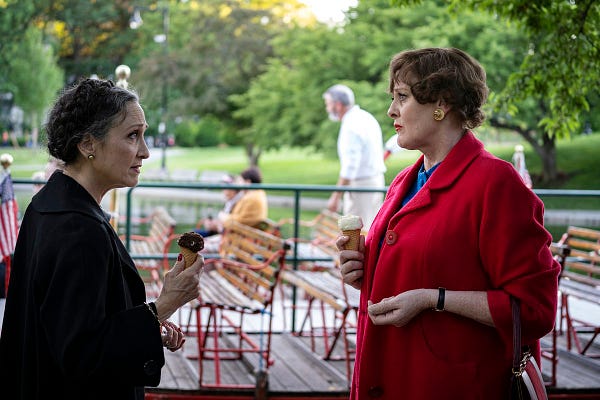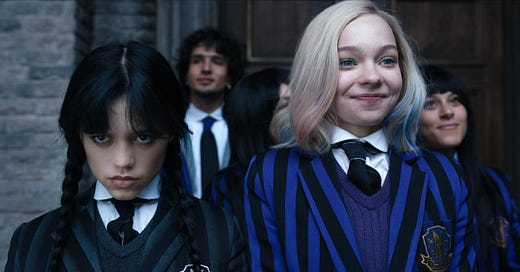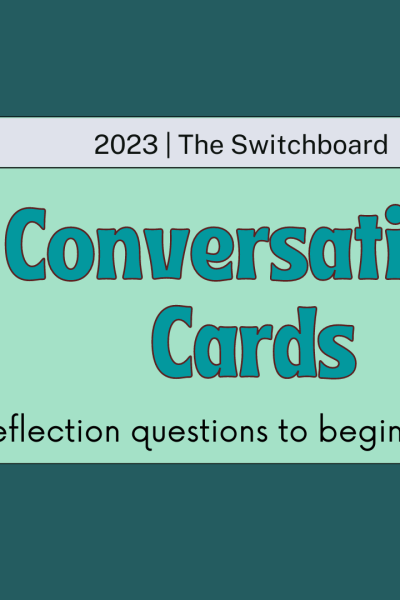📺 What We Can Learn from Wednesday, Acapulco and Ted Lasso
Lessons from 5 top TV Shows for how we communicate at work and beyond
🎉 Happy 2023! Take a look back at last year’s posts here. This week, The Switchboard turns two! Thank you for following, commenting and supporting the interviews, best practices and learnings. I’m grateful for each of you and the community you’ve helped create.
To celebrate, I created conversation cards with reflection questions to begin the new year — contemplate them on your own, with your team or with friends and family. Consider tracking your responses to revisit next year.
📺 Now, on with the show! I hope your holiday season was filled with rest, good food and quality TV time. As I recharged, I enjoyed several shows that made me think a lot more than I expected. Ever since I spoke with Emily Singer Mandel about how she learns, I’ve approached watching TV through a different lens:
“Because of my background in film, I learn from watching people talk and react in real-life settings. I approach learning as a screenwriter. It’s not about what people are saying, but the intention and energy behind it. When you're writing a scene, the words don’t matter.
The characters have their motivation. They know what they’re supposed to accomplish in the scene. The words could be anything because all of the acting is coming from non-verbal communications. The same is true of communications.”
I decided to take a look back at five powerful shows that I watched last year. Upon reflection, I realized just how much they can teach us about the ways we communicate at work. Spoiler Alert: If you haven’t seen the below shows — Wednesday, Acapulco, Julia, Ted Lasso and Slow Horses — stop reading because there are plot giveaways!
If you have seen these shows or others with impactful lessons, I welcome your thoughts — what shows resonated with you for the ways we communicate at work and why?🔮 #1 Wednesday
At first glance, this barracuda pool-dropping tween appears to lack empathy, a major red flag for communicating at work. As the show goes on, Wednesday reveals just how much she cares as she’s on a mission to save Nevermore Academy.
Along the way, she befriends Eugene, a Hummer with bee powers. When he is put in a coma by The Monster, Wednesday blames herself, shows remorse and visits him regularly in the hospital. Wednesday’s relationship with Thing, the Addams’ family hand, is filled with highs and lows. But, when Thing is hurt by an intruder, Wednesday won’t give up, rushing Thing to Uncle Fester for help and pleading for Thing to come back to life.
In the finale, we see the true bond between two roommates — Wednesday and Enid finally hug after an epic battle between Wolf and The Monster. It shows just how much Wednesday cares for her roommate after an entire season of not showing emotion.
Lessons Learned: Colleagues care, even when they might not show it. Take care of your (work) friends. Be persistent in pursuit of a goal. Tap into your superpowers. 🏖️ #2 Acapulco
There’s something incredibly sweet about this show. Maximo gets a job at his hometown’s famous resort, Las Colinas, ultimately giving more than his salary to help his mother pay for life-saving eye surgery.


Later, he gives up half of his tips so that his best friend Memo can finally work with him at the pool. Despite Maximo’s kindness, there are consequences for one mistake when he gives away celebrity secrets from the resort to the paparazzi. But, Maximo finds a clever way to return, help the hotel and is given a second chance.
Throughout the show, Don Pablo is a mentor for Maximo — a second son of sorts after Don Pablo lost touch with his son by choosing work over family. Ultimately when Don Pablo is reunited with his son by Maximo, Don Pablo takes a vacation for the first time in years. When Don Pablo asks for extra time off, Diane, the owner of the resort, says no. After many years of missing out on his life for work, Don Pablo quits. Ultimately, Diane realizes her mistake and pleads with Don Pablo to return, even giving him part ownership in the resort.
Lessons Learned: Prioritize family. Second chances are possible. Treat your employees well. Take vacation. Give employees ownership in their workplace. 🍰 #3 Julia
As a Julia, I already love Julia Child. This series made me a fan even more. An incredible chef who changed the course of television and the way that Americans eat, Julia is portrayed navigating the challenges of turning her idea for a show into reality.





After receiving a rejection, Julia has the gumption to fund the show herself. She is (mostly) not dismayed by criticism, even when it’s hurtful personally. Ultimately, Julia wins her naysayers over with her incredible food or outsmarts them.
When her editor, Judith Jones, is chastised by the publishing house for spending too much time on Julia’s show, Judith believes in Julia so much that she takes a vacation to help. Now that’s dedication! I’ve always been in awe that Julia Child published "Mastering the Art of French Cooking" at 50 years old. It’s an incredible accomplishment and the show mostly demonstrates the ways she made it happen with some historical changes.
Lesson Learned: Any career is possible at any age. Believe in yourself. Sometimes you have to take matters into your own hands. Bon Appétit!⚽ #4 Ted Lasso
A lot has already been written about this American football coach who becomes a British soccer football coach. As Ted faces a team and owner (who secretly) do not want him as their leader, he defies the odds with his cheery disposition, inspiring idioms and authenticity.


Despite his enthusiasm, Ted shows vulnerability as he deals with his divorce, shares the tragic story of his father’s suicide and owns up to his mental health challenges. The show also features powerful characters who address their own struggles — Rebecca deals with a bitter divorce, Roy wrestles with retirement and Jamie struggles with his father.
This Inc. Magazine article on “4 Leadership Lessons From Ted Lasso” by Jason Hennessey shares more on this topic:
Ted urges his team to choose to be happy. "You know what the happiest animal on Earth is? It's a goldfish. Do you know why? It's got a 10-second memory," he says. Be a goldfish. Forget the slights of the past and focus on the present. Lingering on past problems won't change them, it will only serve to foment the negative energy.
There have also been many LinkedIn posts on this topic. Harvard Business School’s Amy Edmondson, the Novartis Professor of Leadership and Management wrote about responsibility. Brian Solis, VP Global Innovation Evangelist at Salesforce shared powerful leadership reflections.
Lessons Learned:Show Empathy. Believe in possibility. Don’t judge. Put yourself in someone else's shoes. It’s okay to ask for help. 🕵🏻 #5 Slow Horses
This show tells the story of “a dysfunctional team of MI5 agents — and their obnoxious boss, the notorious Jackson Lamb — as they navigate the espionage world's smoke and mirrors to defend England from sinister forces.”


Each of the members of Slough House made errors that took them out of the field and put them into a closely monitored work environment with specific tasks, often with little explantation for why. But, they begin to find their way as they are assigned or assign themselves cases to solve UK national security threats. But, the Slough House team is treated as second-class employees compared to MI5 and faces rude comments from their peers and leaders.
One of the agents, River, puts significant pressure on himself to get out of Slough House — after all, his Grandfather was a leader in the agency. When trying to solve a case and another agent is seriously injured, River knows it’s a danger for him to visit her in the hospital, but goes anyway because he cares.
When another agent, Min, is killed, Jackson doesn’t believe the story of his death being a hit-and-run. Jackson pursues justice to find the truth and honor Min’s legacy, even when he is told that it’s not possible. While Slough House agents face many obstacles, they persevere in pursuit of the truth. The twists and turns are endless.
Lessons Learned: Never underestimate someone’s potential because of one error. Check in on your colleagues. Overcome obstacles to pursue your passions. Thanks for tuning into this edition of The Switchboard. If you’ve watched Wednesday, Acapulco, Julia, Ted Lasso or Slow Horses — what lessons do you think these shows can teach us? What other shows resonated with you for the ways we communicate at work and why?
As you watch shows or movies this year, consider looking at them differently — no need to bring a notebook and pen with you to the couch — enjoy the experience and reflect at the end. And don’t forget to bring your favorite snacks as you watch. Bon Appétit!Thank you for reading The Switchboard. ☎️ Every edition is personally curated by me — Julia Levy. Learn more about why I write. Review the Index of past posts.
If you enjoyed this article, consider sharing it, giving a heart below ❤️, commenting or posting on LinkedIn and Twitter.








Julia, such an excellent idea to look for and find workplace lessons in popular TV series. I’ve only seen two of these--Ted Lasso and Julia--both of which I thoroughly enjoyed. Ted’s humanity, humor and optimism in the face of adversity and opposition came across as admirable and necessary traits in his line of work and unusual situation. Julia’s indomitable personality, talent and sheer grit helped her overcome the odds and become a feminist icon and groundbreaker.